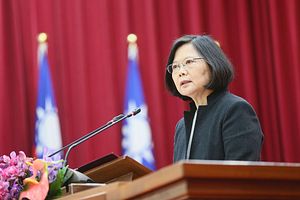In his report to the 19th National Congress of the Chinese Communist Party, President Xi Jinping hoped that “agreements in heart and soul” with Taiwan could be reached. This might be a sign that the mainland is taking new steps to pave the way for reunification rather than simply obstructing Taiwanese independence. Despite Xi’s rhetoric, the mainland has made no moves forward; indeed, it is the mainland’s policy — its single-minded insistence on Taiwan embracing the 1992 Consensus — that is the main roadblock to improved relations.
The 1992 Consensus, once perceived as a breakthrough in cross-strait relations by the mainland, has today triggered an impasse between the mainland and Taiwan. President Tsai Ing-wen of Taiwan and the Democratic Progressive Party (DPP) she leads refuse to affirm the 1992 Consensus and have proposed seeking a new basis for relations. However, the mainland has repeatedly reiterated that talks with Taiwan will not resume without the 1992 Consensus as the common political foundation.
The Consensus refers to the results of a semi-official meeting in 1992, in which both sides acknowledged that they both belong to one China, but with different interpretations on what that China stands for. It acknowledged existing disputes but preserved enough ambiguity to avoid confronting them, allowing the mainland and Taiwan to build constructive dialogue on other issues. The Consensus has served an important role in reducing mistrust and hostility and opening communication.
The mainland regards the 1992 Consensus as a strategic asset. The Consensus provides the One China framework that allows the mainland to promote reunification and oppose Taiwan independence, and it had worked well as foundation for communication and cooperation between the mainland and Taiwan until Tsai’s election. Abandoning the 1992 Consensus is risky for the mainland because any new framework could potentially move cross-strait relations further away from the One China principle.
Following this logic, the mainland’s current strategy is to use carrots and sticks to coerce Taiwan to comply. Beijing holds out promises to share economic opportunities, while also applying pressure, such as urging tour group operators to reduce travel to Taiwan and blocking Taiwan’s attendance at the UN Convention on Climate Change (UNFCCC) and the World Health Assembly.
However, these tactics have only exacerbated hostility and distrust and triggered the current deadlock between the mainland and Taiwan. Although the 1992 Consensus was a symbolic breakthrough toward peaceful coexistence, its diplomatic value dwindled once peace and negotiations became the overarching theme. Maintaining a constructive relationship requires continuous forward-leaning momentum, but the debate over the 1992 Consensus has derailed possibility for new negotiations. Insistence on the Consensus is becoming a liability for the mainland, and impedes Beijing’s diplomatic flexibility in cross-strait affairs.
The mainland’s official stance leads it to side with the Kuomintang (KMT), which was in power when the Consensus was made, but complicates relations with the DPP, the current ruling party, which never endorsed the original agreement. It is unwise for the mainland to take sides in party politics between the KMT and the DPP. It risks poisoning relations with the current (and future) government of Taiwan, offers Taiwanese parties a wedge issue to use in their own political competitions, and polarizes public opinion on cross-strait relations.
The mainland’s punitive approach toward the DPP has cost it dearly with the Taiwanese public. Diplomatic and economic “sticks” challenge the credibility and sincerity of the mainland’s “carrots” and confirm Taiwanese suspicions that the mainland intends to coerce Taiwan against its people’s will. According to an October 2017 poll, 72.6 percent of Taiwanese people consider the mainland’s current behavior unfriendly. In the same poll, Tsai’s cross-strait policy has an approval rate of about 45 percent, higher than the 18.3 percent approval rate of Wu Den-yih, the KMT chairman, who advocates maintaining the 1992 Consensus.
What the mainland needs instead is a new consensus that can unify a social coalition in Taiwan around positive relations with the mainland. It is also worth noting that the 1992 Consensus is not irreplaceable. There are alternative agreements to assert the One China principle that Tsai may find easier to accept. For instance, she could offer an official announcement that Taiwan will not pursue independence, or acknowledge that Taiwan is constitutionally bound to the “One China” principle.
The mainland’s insistence on the 1992 Consensus no longer serves its purpose, and coercing Taiwan only undermines the legacies of previous conciliatory gestures made by both sides. The mainland’s goal of reunification requires Beijing to enhance its overall strategy toward Taiwan and break from its transactional approach.
It is imperative for the mainland to let go of the debate over the 1992 Consensus and resume talks with Taiwan. The mainland and Taiwan can and should rebrand a new consensus that transcends party politics in Taiwan and ideological differences so that forward momentum toward a constructive relationship can continue.
Shining Tan currently works at the East Asia program at the Stimson Center as a research intern. She is also completing her graduate study in Asian Studies at Elliott School of International Affairs at The George Washington University.

































